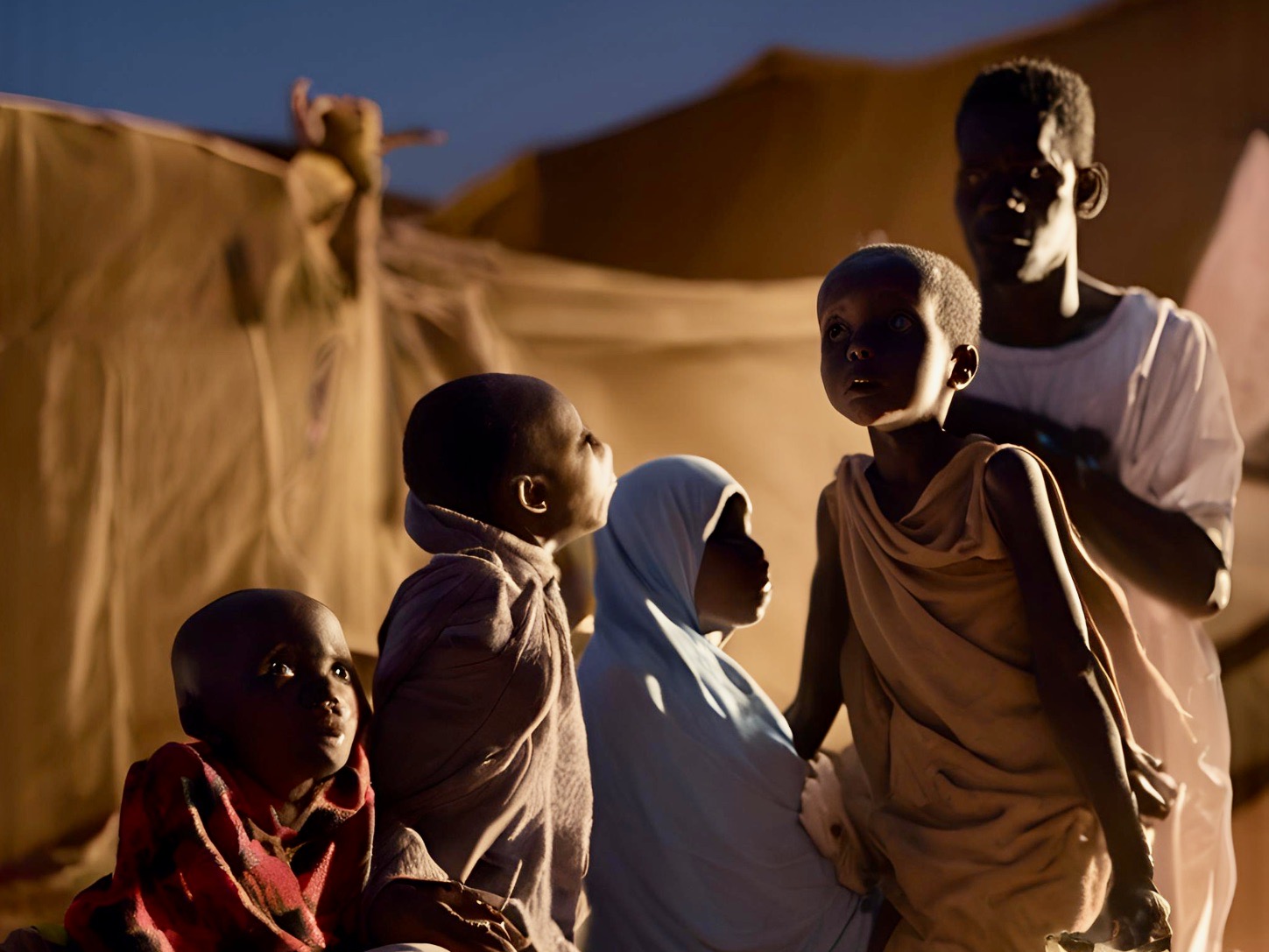Sudan Conflict Monitor #13
May 24, 2024
The Sudan Conflict Monitor is a rapid response to the war in Sudan written through a peacebuilding, human rights, and justice lens, reflecting on the most important stories in the country. Please share it widely.
 1. Security developments
1. Security developments
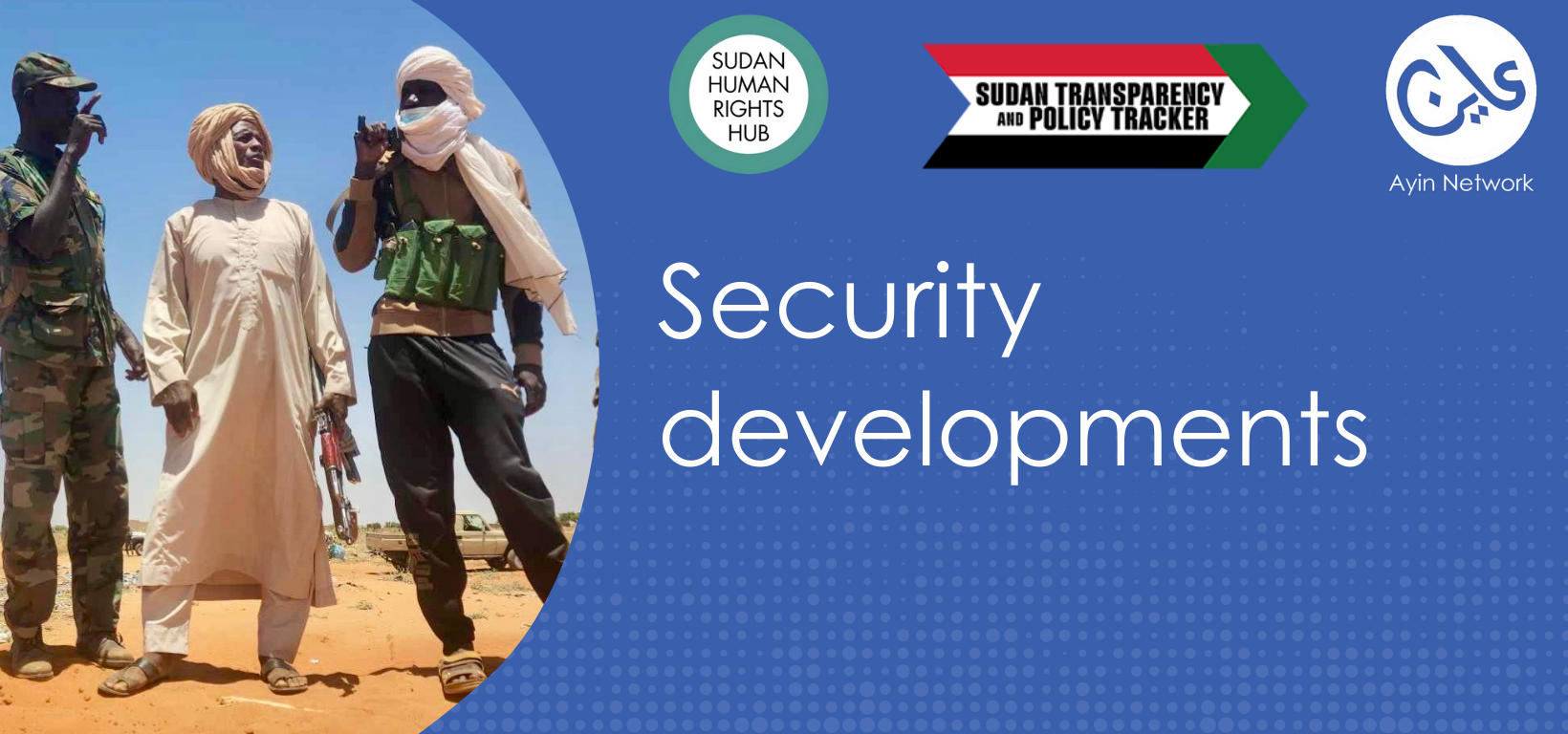 Fighting has continued in Khartoum, Jazeera, Gedaref, White Nile, South Kordofan, West Kordofan, and North Darfur over the past month, but little has changed in the areas that the two belligerent factions control. Both the Sudan Armed Forces (SAF) and the Rapid Support Forces (RSF) continue recruitment and local mobilization efforts in anticipation of continued fighting absent a return to the Jeddah ceasefire table. Furthermore, both sides’ supply lines have flowed robustly, with public reporting capturing weapons flights to the RSF from the United Arab Emirates (UAE) via Am Djarras, Chad, and a new wave of shipments to the SAF in Port Sudan from new patrons such as Russia and Algeria.
Fighting has continued in Khartoum, Jazeera, Gedaref, White Nile, South Kordofan, West Kordofan, and North Darfur over the past month, but little has changed in the areas that the two belligerent factions control. Both the Sudan Armed Forces (SAF) and the Rapid Support Forces (RSF) continue recruitment and local mobilization efforts in anticipation of continued fighting absent a return to the Jeddah ceasefire table. Furthermore, both sides’ supply lines have flowed robustly, with public reporting capturing weapons flights to the RSF from the United Arab Emirates (UAE) via Am Djarras, Chad, and a new wave of shipments to the SAF in Port Sudan from new patrons such as Russia and Algeria.
- The Khartoum – Bahri – Omdurman tri-city area remains SAF’s top military objective. SAF’s coalition of conventional units, special forces, Mustanfareen (recently recruited, formerly civilian) battalions, Darfuri rebel forces, and militia groups such as the Islamist Al-Bara bin Malik Brigade continue to engage in ground combat but have made little progress compared to the previous month. RSF maintains defensive positions around key locations such as the Salha neighborhood and Souk Libya, which serve as logistics hubs for RSF units occupying civilian homes in Omdurman, and the Al-Jaili petroleum refinery, a well-defended enclave within the Qarri Free Zone north of Bahri. In particular, following a series of failed offensives on the Al-Jaili refinery spanning from late April to early May, SAF chose to bomb the facility in the past few days, leading to severe damage to the Al-Jaili fuel storage tanks, if not also the refinery building and pipeline itself. RSF units from Al-Jaili and Northern Bahri have also launched a series of raids towards locations south of Shendi in response. Exchanges of heavy shelling persist between RSF positions in Halfaya, west Bahri, and SAF positions in Wadi Saeedna airport, Omdurman.
- Facing SAF offensives over the past months, the RSF continues to hold the city of Wad Madani while maintaining a presence across Jazeera State and the Butana region. Although RSF reportedly faces severe command and control issues – relying exclusively on a series of area/ sector commanders such as Aqila Abu Kikal, Ahmed Goja, Abdel Rahman al-Bishi, Abu Shottal, and Al-Taher Saad Muhammad Jah to organize its forces – SAF has been unable to make significant progress. SAF’s three-pronged offensive from Manaqil [West], Sennar [South], and al-Fao [East] faces challenges of coordination between SAF conventional units and allied armed groups such as the Sudan Liberation Army – Minnie Minawi (SLA-MM), the Sudan People’s Liberation Movement – Malik Agar (SPLM-N-MA), the Justice and Equality Movement (JEM), and the Sudan Liberation Army-Tambour (SLA-T). Several sources from the SAF-aligned armed groups raised complaints about the army, including its failure to share intelligence, supply ammunition, and provide adequate air support. Nevertheless, groups of locally recruited SAF-aligned militias, including a sizeable number of Islamist fighters, have started to see success in temporarily repelling the RSF from a number of villages across Jazeera State.
- Groups of Hawazma and Misseriya RSF fighters remain active in parts of South Kordofan, loosely coordinating with RSF area command, disrupting civilian livelihoods in neighboring areas. Clashes also occurred in Abu Kershola locality in April, with RSF claiming to have captured SAF’s Khor al-Dalib camp. Several local and media sources have refuted this, but they still mention some clashes between SAF members and the nearby civilian communities.
- SAF and RSF continue to clash over the Kosti-El Obeid corridor in White Nile and North Kordofan states. The RSF continues to hold the towns of Um Rawaba and Wad Ashana in the face of SAF airstrikes and forays along the Kosti-El Obeid road, and SAF uses Tendelti as a defensive location for the city of Kosti itself. SAF’s 5th Division “Hajjana” attempted a brief push from El Obeid city towards a camp in Jebel Kordofan, leading to clashes that killed RSF sector commander Abdel Moneim Ibrahim Sheria, but was forced to retreat shortly afterward with at least several hundred reported casualties and no significant change in territory. Ground sources note that, in the past week, SAF has massed forces in Tendelti with plans to push towards Um Rawaba imminently.
- RSF continues its assault on Babanusa with initial reports that RSF leadership is attempting to expand the West Kordofan front towards cities such as Al Fula and El Nahud, pending negotiations with local communities and RSF’s own constituencies. Although RSF remains focused on West Kordofan, it faces capacity limitations as some of its forces have peeled away towards North Darfur in light of the April 13 El Fasher escalation. By late April 2024, ground sources observed RSF South Darfur Area Commander Saleh al-Futi having moved away from Babanusa with a sizeable column of vehicles towards the road between Nyala, South Darfur, and El Fasher, North Darfur State. Hailing from the Misseriya tribe, Al-Futi was previously a key figure in the RSF’s West Kordofan offensive.
- The RSF continues to amass forces, with one senior RSF source claiming to have prepared as many as 28,000 soldiers in its siege of SAF and pro-SAF Darfuri armed groups inside the city of El Fasher. These forces are roughly divided into three sectors, covering roads exiting El Fasher: 1.) A contingent of RSF, primarily under the command of RSF North Darfur Area Commander Al-Nour Al-Guba, has been tasked with holding positions around El Fasher power station and has occasionally probed as far as Al-Jenubi Hospital. 2.) A second contingent of RSF under the command of RSF Central Darfur Area Commander Ali Yagoub Jibril maintains its base in Mellit, to the northeast of El Fasher, and has repelled several attempts by SAF and Darfuri armed groups to regain control of the El Fasher-Mellit road. 3.) A third contingent of RSF, likely under the command of RSF North Darfur Deputy Commander Gedo Abu Anshook, is stationed to the west of the city, several kilometers away from Zamzam IDP camp, with patrols carefully guarding the road into El Fasher.
SAF and Darfuri armed groups have robustly deployed in defensive positions across El Fasher city, with SAF’s 6th division conventional units largely sitting in the western and northern parts of the city alongside SLM-AW splinter faction commander Sadiq Al-Fuka’s forces, who occupy positions inside Abu Shok IDP camp. Darfuri armed groups – primarily SLA-MM and JEM – are tasked with defending southern El Fasher while sharing positions with SAF units in the eastern part of the city. SAF air force remains active in the El Fasher conflict, reinforcing forces in the city via at least four separate airlifts of weapons and supplies throughout April-May and launching frequent night-time airstrikes. Although some of these airstrikes have hit RSF positions, others have landed in civilian neighborhoods, villages, and the Babiker Nahar hospital in southeast El Fasher.
Several mediation initiatives proposed by Darfuri armed group leaders not currently involved in the fighting, such as El Hadi Idris, Suleiman Sandal, and Abdulwahid Al-Nur, as well as local and Native Administration leaders, remain ongoing but have yet to report any substantial progress.
2. Political developments
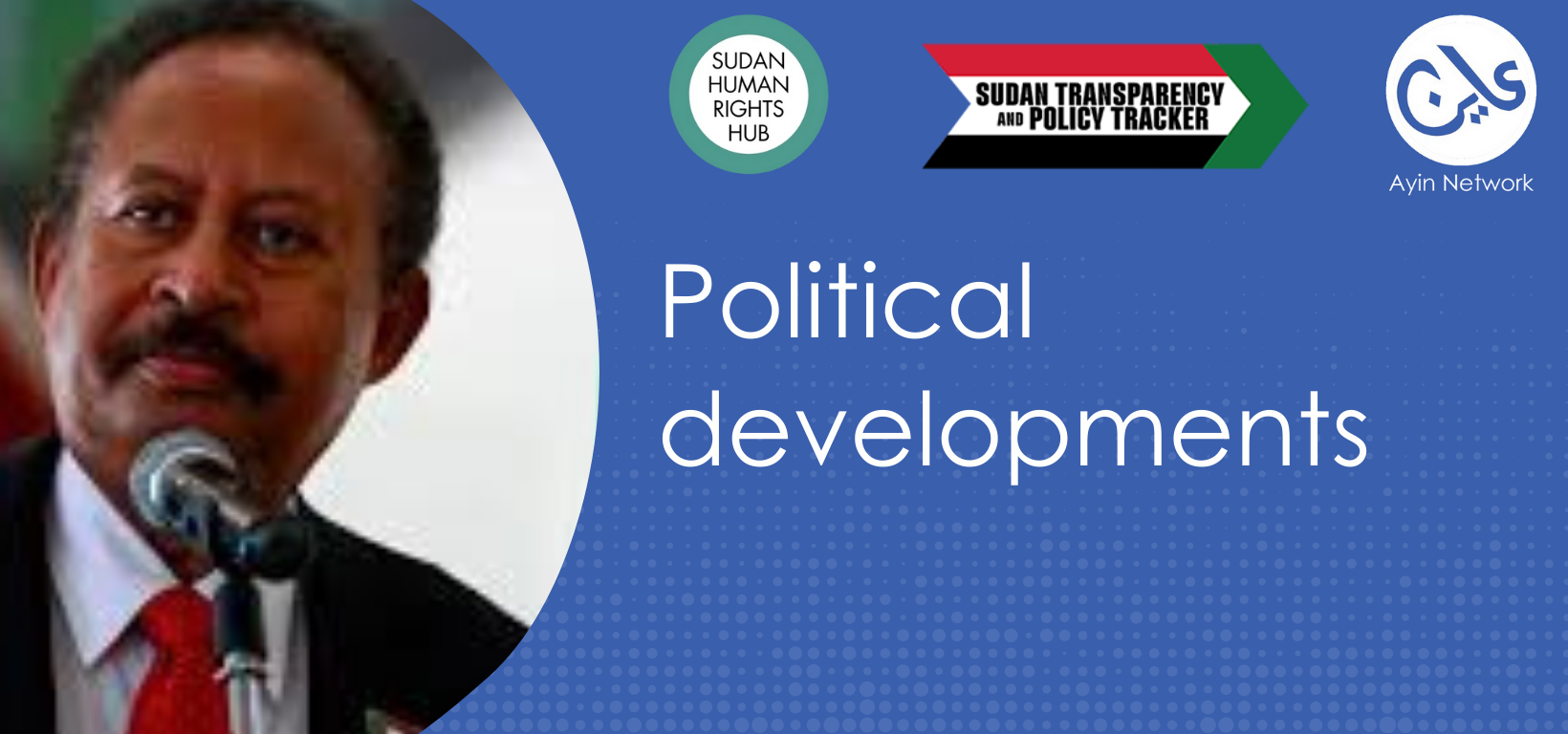 Civilian unification efforts
Civilian unification efforts
In April 2024, international conferences spanning from Paris to Helsinki to Switzerland to Berlin aimed to coalesce disparate and overlapping groups of Sudanese political elites, civil society, and grassroots activists. In addition, a Sudanese civilian bloc, the Civil Democratic Forces Alliance (Taqaddum), led by former Prime Minister Abdallah Hamdok, is expected to convene its official founding conference in Addis Ababa, Ethiopia, in the last week of May.
The SAF continues to reject the legitimacy of Taqaddum as a representative civilian body. On May 8, a group of 48 SAF-aligned parties and movements gathered in Cairo to launch “The Understanding Framework Vision for Managing the Transitional Founding Period.” The leader of the Islamist “Reform Now” movement, Ghazi Salahiuddin, is also a member of the FFC-Democratic Bloc.
These two coalitions reflect long-standing divisions within Sudanese civil and political society, such as between the FFC and FFC-Democratic Bloc ahead of the October 25, 2021 military coup and between those who signed the Framework Political Agreement and those who joined the Cairo-organized Coordination of National Democratic Forces in early 2023.
Although Taqaddum signed the Addis Ababa declaration with the RSF on January 2, 2024, relations between their respective leaders appear to have since cooled considerably. While some point to Western diplomatic pressure condemning Taqaddum’s relationship with one of Sudan’s warring parties, others point to the fact that some RSF supporters feel elites in Taqaddum do not represent them.
Some RSF advisors and aligned civilians have begun to establish a new civilian administration known as the Civil Support Authority, or the Hayat al-Isnat al-Madani, in areas such as Jazeera and several states of Darfur. The administration is both a means for these advisers who initiated it to claim political positions within the RSF and to project its ability to govern in the territories it controls by empowering civilians politically and showing that the RSF is committed to a civilian-led government under a federal political arrangement for the country.
According to Darfuri civil society sources, the idea for establishing the RSF Civil Support Authority originated as early as July 2023 in a conference in Togo headlined by RSF political advisor Yousif Ezzat. Later gatherings of RSF advisors and civilian supporters both inside Darfur and among diaspora locations such as Kampala, Uganda, in late 2023 and early 2024 served to refine the idea and nominate leadership.
The RSF Civil Support Authority remains at a nascent stage. Independent Sudanese civil society sources say the Civil Support Authority has neither gained widespread acceptance among civilians living in RSF-controlled territories nor brought order to groups of ill-disciplined RSF soldiers and aligned forces in the areas under its respective jurisdictions.
RSF political advisors launched a new website: https://crsudan.org/. This should be seen as a prelude to broadening the RSF’s political appeal and giving it a political base. The website is oversanitized and makes no mention of the current situation in the country or the current war. It offers no suggestion that the RSF is the defender of the same values and goals pursued by the initiators of this movement.
Former Prime Minister Abdalla Hamdok signed separate political charters with Abdelaziz al-Hilu’s faction of the Sudanese People’s Liberation Movement-North (SPLM-N-Hilu) and Abdulwahid al-Nur, leader of the Sudanese Liberation Movement-AW (SLM-AW), on May 18, 2024. Although Hamdok also heads the Taqaddum civilian platform, he only signed the charter with SPLM-North in Taqadum capacity, opting to use his title as Sudan’s former Prime Minister when signing with SLM-AW.
SLM-AW has aspirations of building a separate national coalition of civilians and has attempted to court Al Hilu as early as July 2021 and the Sudanese Communist Party in May 2022. SLM-AW has also signed bilateral political agreements with three other non-Taqaddum participating parties: the National Umma Party, the Arab Socialist Ba’ath Party, and a faction of the Communist Party. Those three parties signed a joint agreement in March 2024.
3. Humanitarian developments
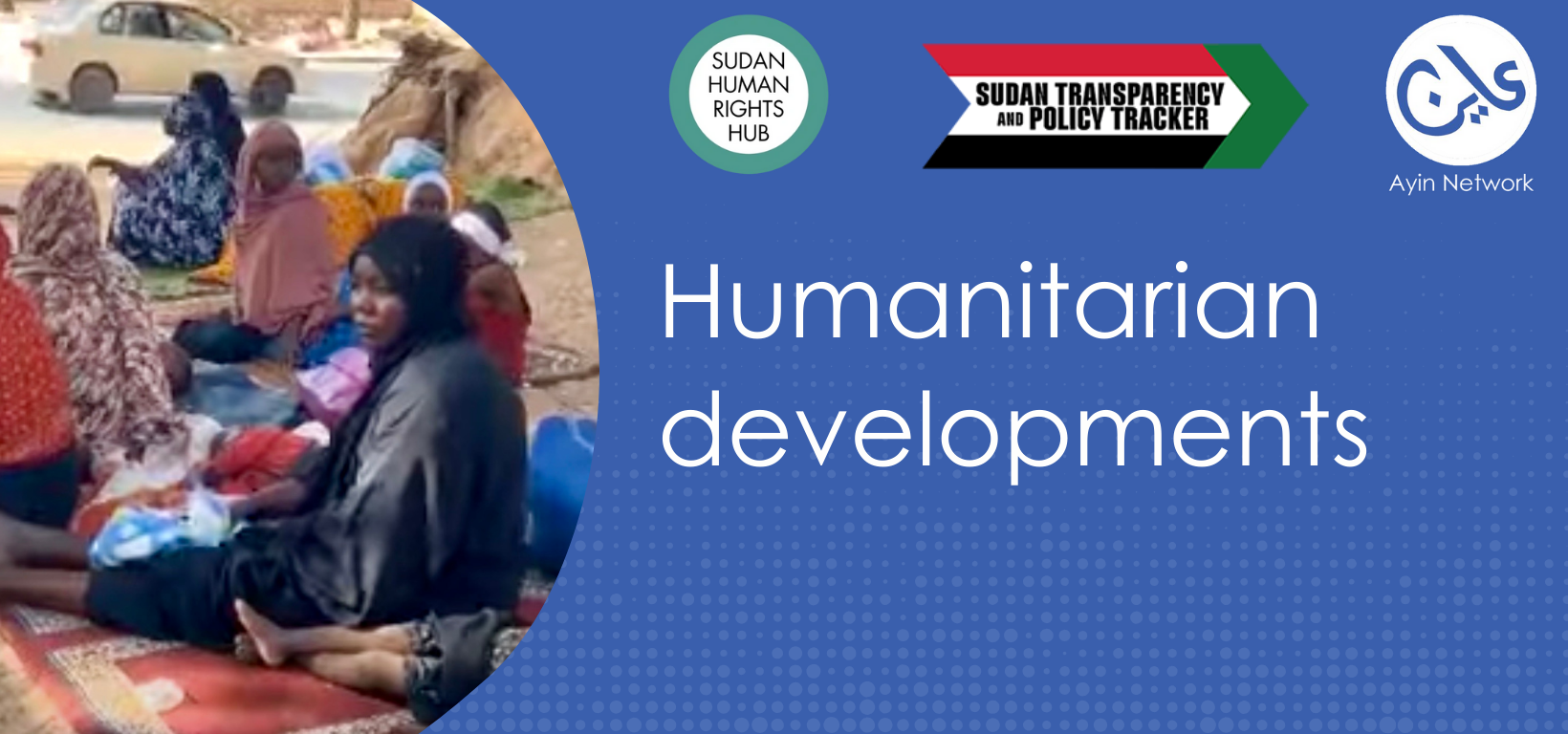
The humanitarian situation in Sudan continues to worsen. On May 3, FEWS NET reported that they anticipate Emergency (IPC Phase 4) outcomes across Darfur, Kordofan, and some parts of eastern Sudan and Catastrophic (IPC Phase 5 outcomes in parts of West Darfur, Khartoum, and among displaced persons throughout Darfur. Despite the building effort that famine is coming (or perhaps has already begun), humanitarian agencies have only been able to raise 12% of the needed capital. Unless additional funds are received soon, humanitarians will not be able to scale up in time to avert the worst outcomes.
Of particular concern is the situation of IDPs in and around El Fasher, already displaced and largely with nowhere left to run. IDP leaders report that the camps are already suffering severe deprivation. The camps lack war, electricity, internet, and food. A refugee camp spokesperson said that 20 people had died of hunger since the city came under siege.
At the same time, access issues remain a key stumbling block. SAF has continued to block visas, deny access routes, and manipulate aid for political ends, as evidenced by its recent denial of aid to SPLM-North controlled areas in Southern Kordofan State and Blue Nile State. Forces on both sides have attacked health and aid workers. On May 2, two drivers from the International Committee of the Red Cross were killed and three injured in an attack on their convoy by armed men. The RSF also refused to allow humanitarian aid through the Port Sudan – Al-Dabbah – Mellit – El Fasher route, arguing that this could be used to deliver military supplies to the 6th Infantry Division in El Fasher.
The Sovereignty Council’s deputy chair, Shams al-Din Kabashi, led a SAF delegation that met with the South Sudanese government on May 3, 2024, in Juba. The SAF delegation also met with a delegation of SPLM-North headed by Abdelaziz al-Hilu, ostensibly to discuss humanitarian access to areas under SPLM-North control. The preliminary talks concluded with the two parties agreeing in principle on delivering humanitarian aid to Sudan’s South Kordofan and Blue Nile regions, with each party taking responsibility for delivering aid in areas under its control.
However, the talks collapsed after South Sudanese mediators adjourned the second round. The Minister of Defence, who led the SAF delegation, blamed the collapse on SPLM-North’s insistence on including the RSF in the discussions. However, SPLM-North, in a May 21 statement, accused the SAF of sabotaging the talks by demanding military air bridges to deliver “supplies” to the SAF-besieged garrisons in Kadugli, Abu-Gibaiha, and Babanusa and proposing plans for securing the airports in these towns by a joint force.
The SPLM North said it made three proposals: to facilitate humanitarian deliveries with or without agreement with the SAF, or through separate agreements between the parties and humanitarian aid agencies. It also stated that the RSF and SAF need to conclude a humanitarian cessation of hostilities agreement to allow cross-line deliveries in RSF-held areas that have the largest numbers of people facing imminent famine.
The South Sudanese mediation remains optimistic that the talks will resume. However, given the positions of the parties, this seems unlikely.
4. Human Rights
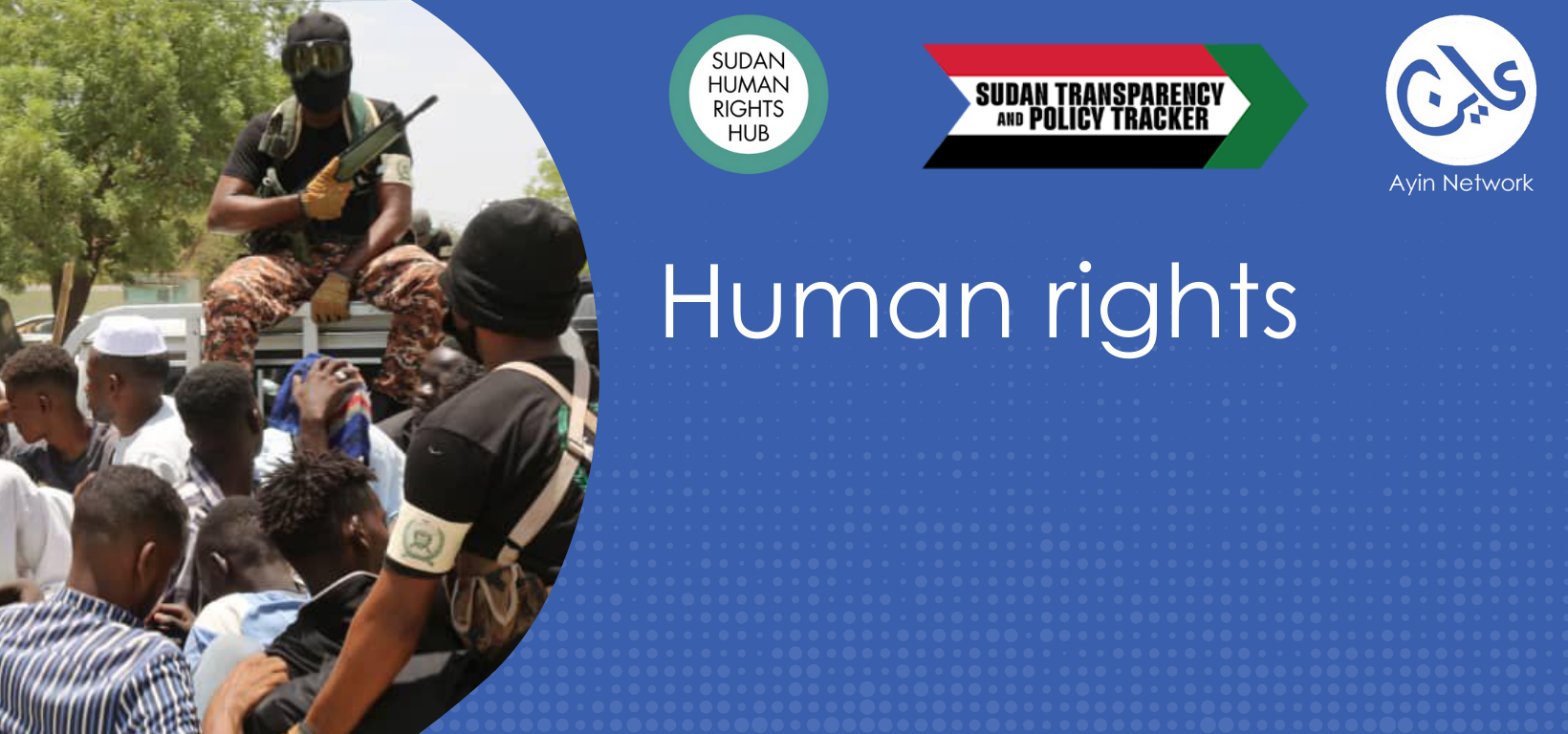
All eyes have been on the situation in El Fasher, North Darfur. The city has been a hub for JPA-signatory armed groups, who are now aligned with the SAF, and has been under siege by the RSF for weeks. The parties clashed in and around the city, shelling and bombing, destroying a hospital, and causing civilian casualties. The Yale School of Public Health Research Lab revealed that between May 14 and May 18, “probable RSF elements” burned at least 11 communities close to El Fasher and targeted an additional 39 football fields’ worth of land.
As of this writing, the fight for the city appears to be intensifying. MSF reported that at least 85 civilians were killed and 700 wounded between May 10 and 20. On the 20th, RSF reportedly fired on a number of civilian areas in the city, including in the Abu Shouk displaced persons camp, and army planes also reportedly bombed other civilian areas.
Conditions are dire, with dwindling supplies, increasing prices, and a lack of medical care, with only one hospital now functional. If the RSF is able to take the city, there is an increased risk of ethnically motivated violence similar to what happened in El Geneina last year. An estimated 1.8 million city residents and IDPs are believed to be trapped in the city, although the RSF has recently offered to create corridors to allow them to leave.
Elsewhere in Sudan, bombing, shelling, and clashes are taking a dire toll on civilians. In Khartoum, Bahri, and Omdurman, forces also continue to shell and bomb indiscriminately. On May 18, RSF shelling killed 11 civilians in Omdurman, while SAF bombs reportedly destroyed the Al Jaili oil refinery in Khartoum, which has been under RSF control and out of operation since October. Civilians have also reported killings and injuries in Gezira and in Nyala, South Darfur, where SAF bombings reportedly destroyed homes and caused casualties.
Human rights abuses by both sides continue to be reported widely on social media. In some cases, the belligerents targeted front-line defenders. In mid-May, for example, RSF reportedly arrested 17 volunteers in Shambat, and then released them. Human rights groups have documented how both sides have harassed and detained rights defenders and activists since the conflict started. In early May, Sudan Tribune reported that it found evidence of RSF-run execution centers across the capital cities.
Social media posts of images and videos of extreme, gruesome acts of brutality such as disembowelment, decapitations, and executions in cold blood continue to circulate widely. In February, the SAF announced it would investigate gruesome videos of army soldiers showing off the severed heads of two men believed to be RSF soldiers. SAF denied links to a video circulated in May of two men, believed to be affiliated with the army, disemboweling another man.
In mid-May, the SAF government announced it had passed amendments to the General Intelligence Service law, effectively reinstating sweeping powers of arrest, detention, surveillance, and seizure that existed under the regime of Omar al Bashir. The amendments also provide broad immunity from prosecution for intelligence officers. Some critics say they grant even more powers than the previous National Security Act. Rights groups have monitored how, even before the SAF enacted the new amendments, the intelligence agency, along with military intelligence and other security forces, was using these powers to arrest and detain people arbitrarily. Most recently, at least 16 Ethiopians were arrested in Gedaref, in eastern Sudan, amidst rumours that Ethiopians are being used as mercenaries in the conflict and that the RSF has created “sleeper cells” in the town.
Sudan Mar Monitor reported that lawyers for former President Omar Al Bashir have requested his release from Wadi Saidna, where he has been held since his evacuation from the besieged Aliaa Hospital in Omdurman. The defense argues that not only is the former president eligible for release on medical grounds, but the charges against him are no longer valid due to delays in the process. NCP supporters have been applying tremendous pressure to Bashir to end what they argue is an unjust detention.
5. International response
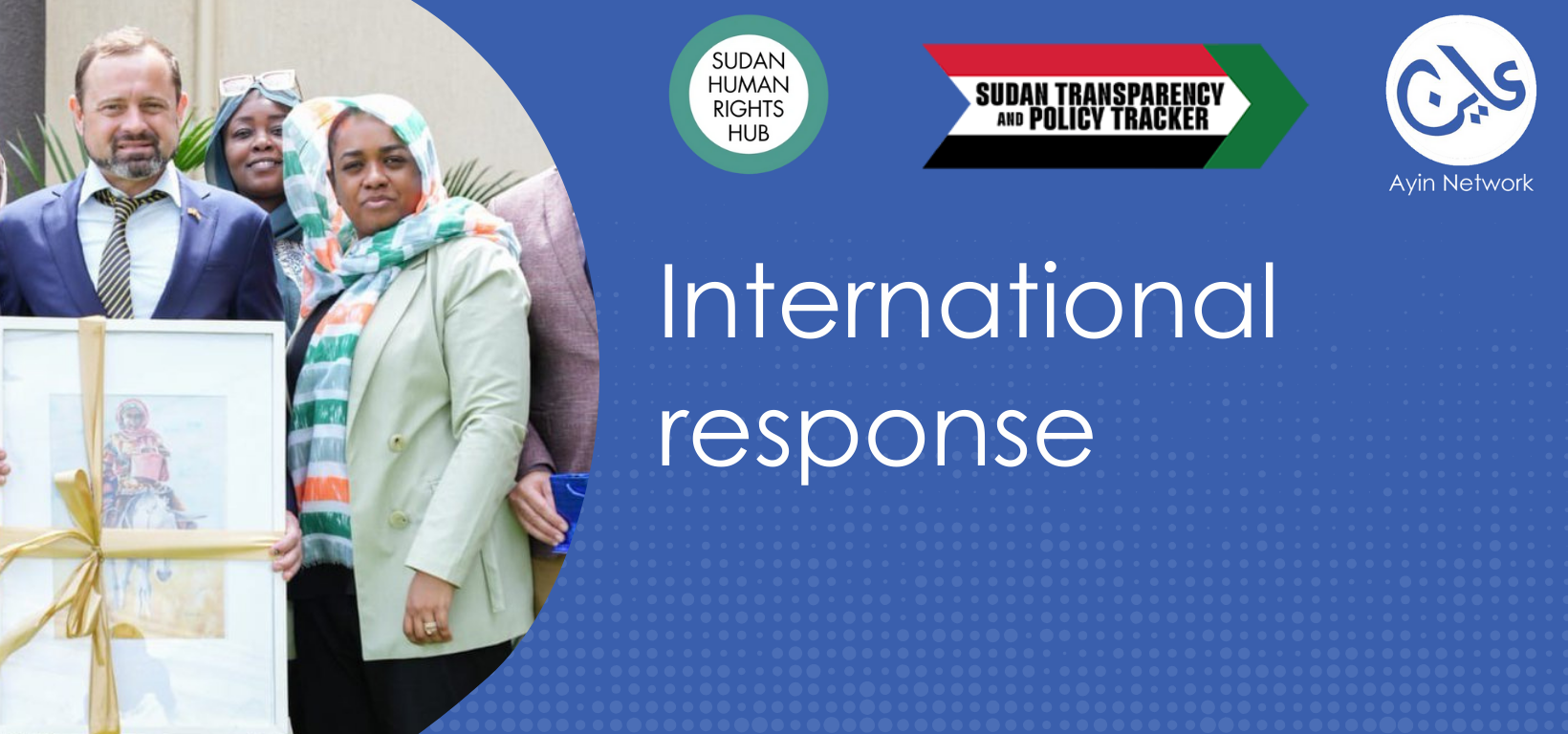
Marking the one-year into the war, various international actors expressed continued concern for the war’s unabated impact on Sudanese civilians, the risk of atrocities, the lack of protection of civilians, and the dire implications of the economic and food security crises. More recently, various actors have raised alarms about events in El Fasher. The UN Special Adviser on the Prevention of Genocide has warned that the “risk of genocide exists in Sudan. It is real, and it is growing, every single day.” The UK Foreign Secretary Cameron denounced the violence and reports of ethnically motivated attacks and called on the parties to de-escalate. The UN Security Council will meet to discuss the situation in Sudan on May 24, partially in response to the ongoing situation in El Fasher.
In the US, Senator Ben Cardin sent a letter to the Biden administration on April 19, requesting a determination of whether Global Magnitsky sanctions should be applied to the RSF and Hemedti in particular. While no such determination has been made, the US imposed new sanctions on two additional RSF commanders, Yagoub Gibril, and Osman Mohamed Hamid Mohamed, for their role in Darfur operations on May 15.
Jeddah talks have yet to resume. The two lead mediators, the US and Saudi Arabia, appear to have differing approaches – the Saudis want an agreement to be made behind the scenes and only resume Jeddah to acquire signature,ture whereas the US would prefer to return to Jeddah sooner and negotiate there. The parties are reluctant to resume as well, with SAF arguing that it wants RSF to stop receiving arms as a precondition for talks and seeking to influence the United Arab Emirates to end arms shipments to RSF. The UN Envoy to Sudan is reportedly preparing an effort to coordinate various mediation initiatives.
More from our partner organisations:
Sudan Transparency and Policy Tracker
Sign up to the Sudan Transparency and Policy Tracker newsletter here.
- The military, economic and humanitarian consequences of the RSF’s control of Mellit, North Darfur, May 2024
- Current status of initiatives to stop the war in Sudan, May 2024
Sudan Human Rights Hub
- Child soldiers in Sudan: The future is at stake, May 2024
- Sudan Attacks on Healthcare Since April 15, 2023, March 2024
Ayin Network
Follow Ayin: Youtube Facebook Twitter
- El Fasher: Shelling continues as civilians remain trapped in the violence, May 2024
- Dying to help, the targeting of aid workers in Sudan, May 2024



